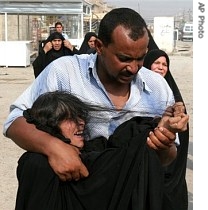2006年VOA标准英语-UNHCR: Iraq Faces Refugee Crisis(在线收听)
By Lisa Schlein
Geneva
03 November 2006
The U.N. refugee agency says Iraq is facing a displacement crisis, on a larger scale than was anticipated when the war began in 2003. The UNHCR says continuing violence is leading more Iraqis to flee their homes.
-----
 An Iraqi woman mourns her son in Baghdad's Sadr City |
||
But he says more and more people fleeing because of the continuing violence.
"And, internal displacement is continuing at a rate of some 50,000 a month," he noted. "This displacement amid the ongoing violence in Iraq is presenting an enormous humanitarian challenge and extreme hardship for both the displaced and the Iraqi families trying to help them in host communities. The enormous scale of the needs, the ongoing violence and the difficulties in reaching the displaced make it a problem that is practically beyond the capacity of humanitarian agencies, including UNHCR."
The UNHCR estimates 425,000 Iraqis have fled their homes for other areas inside Iraq this year alone. It says hundreds-of-thousands of Iraqis have fled to neighboring Jordan, Syria, Egypt, Lebanon and Iran. It says about 2,000 refugees are arriving in Syria every day and an estimated 1,000 a day in Jordan.
Spokesman Redmond says the population movements show no sign of abating. He says the needs are dramatic and are largely unmet.
"Some 50,000 non-Iraqi refugees, mostly Palestinians, Syrians and Iranians, under UNHCR's care inside Iraq are also in an increasingly dire situation," he added. "We fear hundreds-of-thousands more Iraqis, who have waited to see an improvement of the situation are now teetering on the brink of displacement. Many urban professionals have already fled. Doctors, teachers, computer technicians and other skilled people crucial to the country's stability and well-being are leaving."
Redmond calls this a largely silent or invisible exodus. He says people have not been fleeing en masse. Instead, there has been a steady stream of refugees leaving. He says most of the Iraqis are staying with host families or are getting help from local or religious organizations. The danger of this arrangement, he says, is that the refugees are likely to wear out the welcome mat as their numbers grow.
He notes the international community has provided billions of dollars for recovery and development programs for Iraq. He says there needs to be a renewed focus on the humanitarian crisis in the region.